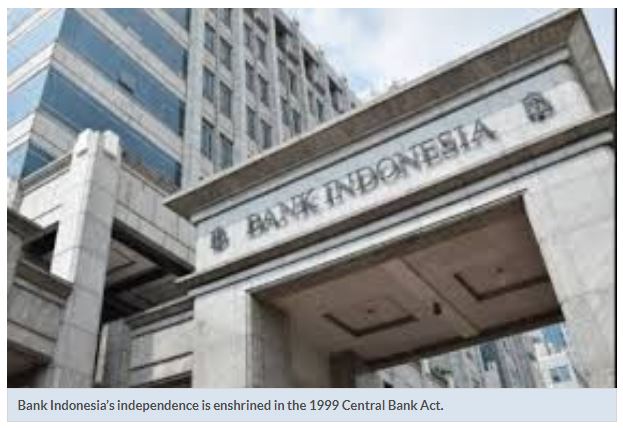Indonesia draft bill seeks govt role in central bank
JAKARTA: Indonesia’s parliament will consider possible sweeping changes to laws that could give the government more authority over the central bank.
A draft bill prepared by a panel of experts and presented to the parliament’s Legislation Committee on Monday proposed setting up a five-member monetary board, led by the finance minister, to help Bank Indonesia determine policy.
It also recommended that the central bank’s mandate be expanded to include supporting economic growth and jobs, and that ministers be included on the current board that sets interest rates.
Bank Indonesia’s independence is enshrined in the 1999 Central Bank Act. Some lawmakers say the bank’s mandate to maintain the stability of the exchange rate is too narrow and have been pushing for a more expanded role for the monetary authority in supporting economic growth.
The central bank already took unprecedented steps this year to buy bonds directly from the government to help finance fiscal spending, raising questions about its autonomy.
Financial markets have given authorities the benefit of the doubt on its debt-financing plans so far, but if there’s any sense at all that the new board supersedes the central bank’s current rate-setting panel, that could be an issue, said Wellian Wiranto, an economist at Oversea-Chinese Banking Corp in Singapore.
“Can’t shake off the feeling that the chickens would come home to roost one day, ” he said. “Especially if the more radical ideas continue to be pushed to the forefront — and ultimately adopted.”
The rupiah was the only Asian currency to weaken on Tuesday, slipping 0.1% against the dollar to 14,578 as of 2:01 p.m. in Jakarta. But given the backdrop of low inflation, the impact of a potential dilution of Bank Indonesia’s independence should have less of an impact on the market than otherwise, Nomura Holdings Inc. said in a report.
Interest rates are currently determined every month by a board of governors, comprising six members and led by Governor Perry Warjiyo. The draft bill proposes including one or more economy ministers and the finance minister onto this board with speaking and voting rights.
The proposals call for a new monetary board, chaired by the finance minister, and also including the economic affairs minister, central bank governor, senior deputy governor, and head of the Financial Services Authority. The board would lead, coordinate and direct monetary policy in line with the government’s economic policies and would meet twice a month or as needed.
Onny Widjanarko, a spokesman for Bank Indonesia, said he couldn’t comment on the proposals as they fall under the authority of the parliament and the government.
Finance Ministry spokeswoman Rahayu Puspasari said the parliament had yet to share the panel’s proposals with the ministry and it was too early to comment.
‘Shock Therapy’
The amendment to the 1999 Central Bank Act is in the parliament’s priority legislation list and the panel’s recommendations may be taken up for discussion by various parliamentary committees in the coming weeks.
Hendrawan Supratikno, a member of the Legislation Committee, said the parliament may need a year or two to complete such a comprehensive amendment to the law. However, the president could issue a decree to enact the changes quickly if he desires, he said, adding he was in favor of the parliament deciding the fate of the bill.
“In times of recession and pandemic crisis, the market needs more cues of stability than shock therapy, ” said Supratikno, who is also a member of parliament’s Commission XI that oversees finance and central bank matters. “We also need to do in-depth review about integration models of financial sectors’ supervision and regulation.”
Said Abdullah, chairman of Parliament’s Budget Committee, said revisions to the law need careful consideration, but it was important to expand the central bank’s role so it takes greater responsibility in supporting growth. “This has become my concern from the beginning, so that Bank Indonesia can enter the real sector, ” he said.
Fluid Deliberations
The deliberations are still fluid and not all that is being proposed may be passed into law, Citigroup Inc. economist Helmi Arman said, adding the proposed changes will allow monetary policy to be closely synchronized with the objectives of political leaders.
“We sense that there has long been general discontent over the position of the central bank that is deemed as “too strong” under the current legislation; and developments during the pandemic have reignited this sentiment, ” Arman wrote in a report. “It is probable that central bank independence will come out of this saga in a weakened position.”
Other major highlights of the panel’s recommendations include:
The monetary board’s decisions will be through consensus and in the event of disagreement between the government and Bank Indonesia, governor can submit his opinion to the former.
Monetary targets to be set by taking into account inflation target, economic growth and job creation.
Bank Indonesia can buy sovereign bonds in the primary market and under certain economic conditions, it may purchase interest-free government bonds at a discount rate that is mutually agreed upon with the government.
BI is allowed to provide temporary financing to the government in the event of a shortfall in revenue.
BI surpluses will be subject to income tax according to the prevailing laws and regulations.
Supervision of banking industry to be returned to the central bank no later than Dec. 31,2023.
“Although a change in mandate to also give support to growth is okay, but having the finance minister lead it is indeed questionable, ” said Nicholas Mapa, a senior economist at senior economist at ING Groep NV in Manila.
“Central bank independence is key to establishing credibility and for clear delineation of mandates, ” he said, adding that “lines have been blurring.” – Bloomberg


 Thailand
Thailand




